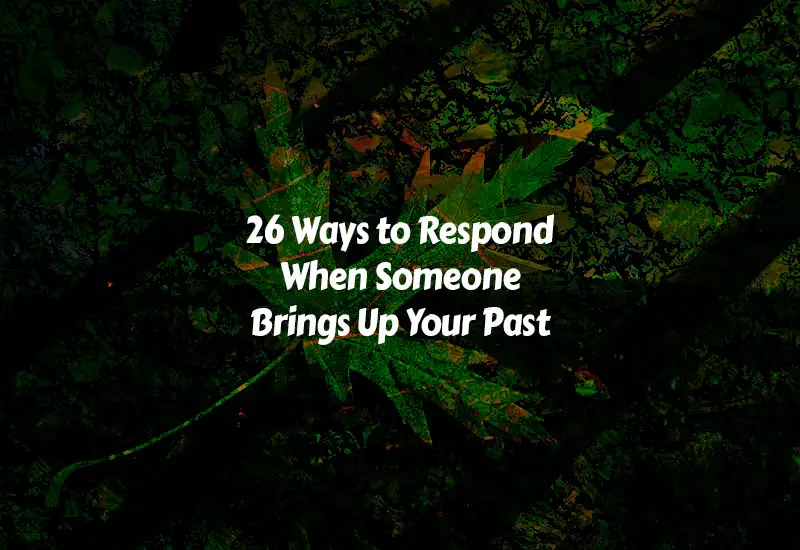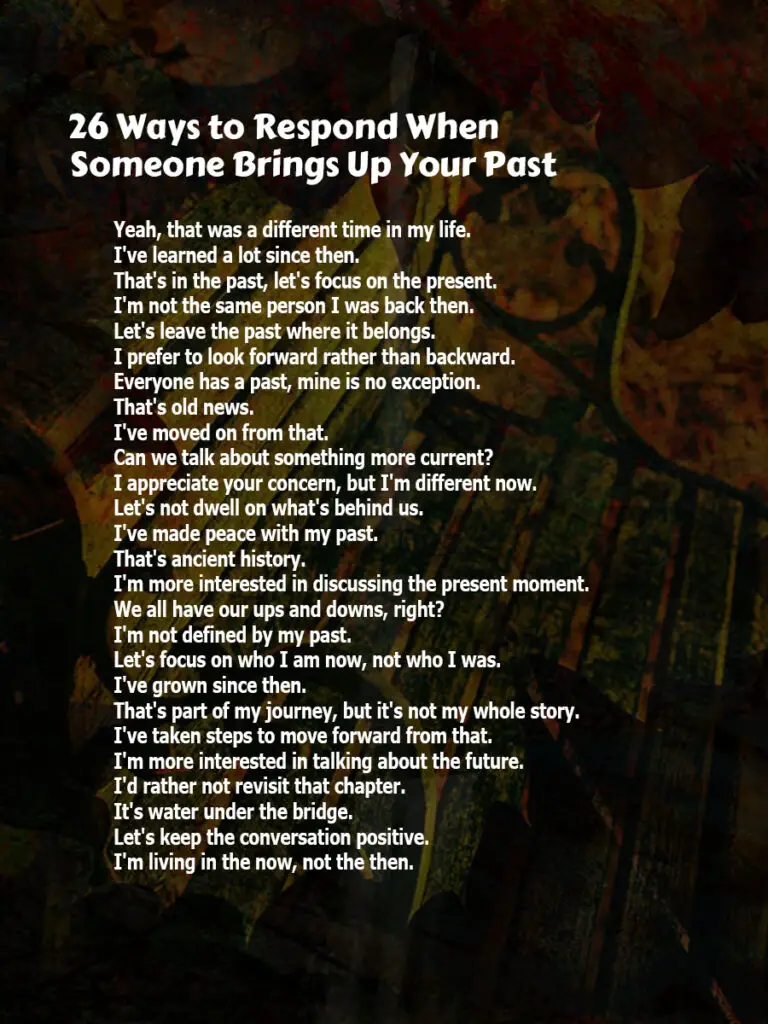When someone talks about things you did before, it can feel tricky. But don’t worry! In this article, we’ll talk about 26 cool ways you can react when people mention your past. Your past is part of you, but it doesn’t define who you are now. So, let’s learn how to handle it like a champ!
Maybe you can laugh it off, or you could say something wise. You might want to explain how you’ve changed, or simply say, “That’s in the past, let’s focus on now.” There are lots of ways to handle it, and we’ll explore them all.
By the end, you’ll feel confident facing those conversations about your history. So, get ready to learn how to respond like a pro! Let’s dive in and discover the best ways to handle it when someone brings up your past.

Here are 26 Ways to Respond When Someone Brings Up Your Past:
- Yeah, that was a different time in my life.
- I’ve learned a lot since then.
- That’s in the past, let’s focus on the present.
- I’m not the same person I was back then.
- Let’s leave the past where it belongs.
- I prefer to look forward rather than backward.
- Everyone has a past, mine is no exception.
- That’s old news.
- I’ve moved on from that.
- Can we talk about something more current?
- I appreciate your concern, but I’m different now.
- Let’s not dwell on what’s behind us.
- I’ve made peace with my past.
- That’s ancient history.
- I’m more interested in discussing the present moment.
- We all have our ups and downs, right?
- I’m not defined by my past.
- Let’s focus on who I am now, not who I was.
- I’ve grown since then.
- That’s part of my journey, but it’s not my whole story.
- I’ve taken steps to move forward from that.
- I’m more interested in talking about the future.
- I’d rather not revisit that chapter.
- It’s water under the bridge.
- Let’s keep the conversation positive.
- I’m living in the now, not the then.
See Also: 25 Great Ways to Respond to a Thank You Note for Students
Acknowledging The Past
When it comes to responding to someone bringing up your past, acknowledging the situation is crucial. Accepting the past and expressing regret are essential steps in handling such conversations.
Accepting The Situation
Accept that your past is part of who you are; it shapes your present self. Recognize mistakes and use them as learning opportunities.
Expressing Regret
Show empathy and understanding by expressing regret for any harm caused. Apologize sincerely and demonstrate willingness to make amends.
Communication Strategies
When someone brings up your past, effective communication strategies are essential in navigating the situation. Addressing the issue through active listening and open dialogue can help manage the conversation and maintain healthy relationships. Here are some ways to effectively communicate when facing this challenging situation.
Active Listening
Active listening is crucial when someone brings up your past. It involves fully concentrating, understanding, responding, and remembering what is being said. By giving your full attention and showing genuine interest, you can demonstrate empathy and build trust. Engaging in active listening can help in acknowledging the concerns of the person bringing up your past and can lead to a more constructive interaction.
Open Dialogue
Open dialogue allows for transparent and honest communication between individuals. Whether the conversation occurs one-on-one or in a group setting, being open to discussing the past can pave the way for understanding and resolution. It’s important to foster an environment where both parties feel comfortable expressing their thoughts and feelings without judgment, promoting a sense of mutual respect and collaboration. Through open dialogue, differences can be addressed and the relationship can be strengthened.
Setting Boundaries
When someone brings up your past, assert your boundaries by calmly stating that you’ve grown from it. Clarify the present situation and redirect the conversation towards positive aspects of personal growth. Setting boundaries in this way empowers you to control the narrative and focus on moving forward.
Clarifying Expectations
One effective way to respond when someone brings up your past is by clarifying your expectations. By setting clear boundaries, you can help steer the conversation towards more productive and positive topics. Let the person know what you are comfortable discussing and what is off-limits. For instance, you could say something like:
“I appreciate your concern, but I would prefer to focus on the present and future rather than revisiting the past. Is there something else you would like to talk about?”
By clearly communicating your expectations, you can guide the conversation towards topics that are more relevant and beneficial.
Reframing The Conversation
If someone brings up your past and it makes you uncomfortable, another way to respond is by reframing the conversation. This involves shifting the focus from the past to the present or future, where you have more control and agency. You can use techniques like redirecting the conversation or changing the subject to keep the discussion on a more positive note. For example, you could say:
“I understand that my past may be of interest to you, but I have learned from those experiences and am focused on my growth and progress. Let’s talk about what I’m currently working on instead.”
By reframing the conversation, you can redirect attention away from your past and towards the more relevant aspects of your life.
Self-reflection And Growth
Self-reflection and growth are key components when it comes to responding to someone bringing up your past. It’s important to acknowledge your mistakes, seek forgiveness, and move forward in a positive and proactive manner. Learning from your past mistakes allows you to grow and evolve as an individual, while seeking forgiveness helps you build stronger relationships and find closure. Let’s explore these two aspects in more detail:
Learning From Mistakes
Learning from your mistakes is a crucial part of personal growth. When someone brings up your past, take a moment for self-reflection. Acknowledge the actions or decisions you made in the past and consider their impact on yourself and others. Instead of dwelling on the guilt or shame, focus on what you can learn from these experiences. This will help you avoid similar mistakes in the future and develop into a wiser and more resilient person.
Here are a few steps you can take for self-reflection:
- Take responsibility for your actions and admit your mistakes.
- Identify the reasons behind those actions and examine your thought process.
- Evaluate the consequences of your past decisions and understand how they have shaped your present.
- Create a plan to improve and make better choices moving forward.
Remember, self-reflection is a continuous process that allows you to grow and become a better version of yourself.
Seeking Forgiveness And Moving Forward
Seeking forgiveness is a crucial step in responding to someone bringing up your past. It takes humility, courage, and a sincere desire to make amends. By seeking forgiveness, you not only show remorse for your previous actions but also demonstrate a commitment to personal growth.
Here are a few tips for seeking forgiveness and moving forward:
- Apologize sincerely and express remorse for the pain or hurt caused.
- Listen actively to the concerns and emotions of the person affected by your actions.
- Show empathy and understanding, acknowledging the impact of your past behavior.
- Take responsibility for your actions and commit to making positive changes.
- Offer a solution or a plan to prevent similar incidents in the future.
Seeking forgiveness is not about expecting immediate acceptance, but about making genuine efforts to mend the relationship and rebuild trust.
See Also: 30 Best Comebacks for Someone Who Thinks They Are Cool
More Additional Response
- The past is behind me, let’s focus on today.
- I’m not dwelling on that anymore.
- Let’s keep things current, shall we?
- My past doesn’t define my present.
- Let’s look ahead, not behind.
- I’m all about forward progress.
- That’s a part of my history, but not my present reality.
- Let’s not dig up old dirt.
- My past mistakes have taught me valuable lessons.
- I’m more interested in who I’m becoming than who I used to be.
- That’s not relevant to who I am now.
- Let’s talk about something more uplifting.
- My focus is on the here and now.
- I’ve left that chapter behind me.
- I’ve grown beyond that phase of my life.
- Let’s give attention to the present moment.
- My past is just that – past.
- I’m living in the present, not the past.
- Let’s cherish the moments we have now.
- The past is a closed book; let’s write a new chapter together.

Conclusion
Navigating conversations about our past can be challenging, but it’s essential to respond with grace and self-awareness. By utilizing empathy, setting boundaries, and focusing on personal growth, we can effectively address these situations. Embracing the opportunity for growth and understanding allows us to move forward positively and maintain healthy relationships.









